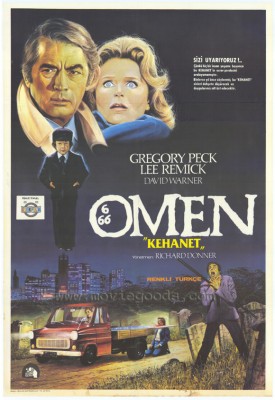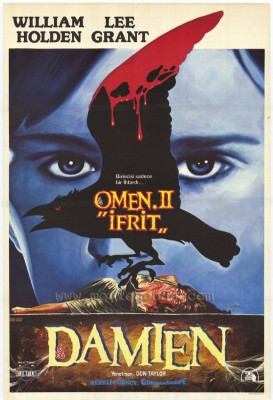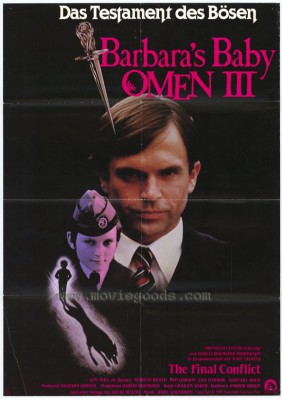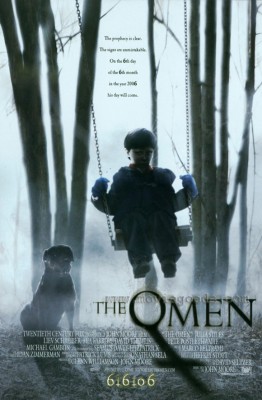| Reviews & Columns |
|
Reviews DVD TV on DVD Blu-ray 4K UHD International DVDs In Theaters Reviews by Studio Video Games Features Collector Series DVDs Easter Egg Database Interviews DVD Talk Radio Feature Articles Columns Anime Talk DVD Savant Horror DVDs The M.O.D. Squad Art House HD Talk Silent DVD
|
DVD Talk Forum |
|
|
| Resources |
|
DVD Price Search Customer Service #'s RCE Info Links |
|
Columns
|
|
|
Omen Collection (The Omen / Damien-Omen II / The Final Conflict / The Omen [2006]), The
The extras are plentiful; one could gripe that most of it consists of material from previous laserdisc and DVD releases (in some cases multiple times) and the overuse of clips becomes awfully repetitious, but it still amounts to dozens of hours-worth of commentary tracks and extensive featurettes, some of which are well above average. Although a few items like the trailers could've/should've been remastered to high-def, it's an exhaustive amount of material.
The runaway success of The Exorcist in 1973-74 unequivocally killed the modest-budget horror film in the Hammer/Amicus/AIP mold, and convinced studios unmotivated by the big success of Rosemary's Baby in 1968 that there was a potential goldmine in slick horror films for mass market consumption, particularly religious thrillers films rooted in End Times prophecies and demonic offspring. The Omen was among the first and in many ways the best film to capitalize on this. For what it is, it's almost a perfect film: clever, ingenious even, genuinely unsettling and at times audaciously shocking. It's got several outstanding performances; a superb, incredibly influential musical score by Jerry Goldsmith, good photography and editing, and a production polish that utterly belies its $2.8 million cost, chicken feed by 1976 studio standards.
Adapted by David Seltzer from his novel, The Omen opens in an Italian hospital where an American diplomat, Robert Thorn (Gregory Peck) is told that his wife has given birth to a stillborn boy. However, a priest there convinces Thorn to secretly adopt another boy born that same morning - June 6th, at 6:00am - but whose mother has died. Wanting to spare Katherine (Lee Remick) the anguish of losing her baby, Thorn agrees to the ruse. Soon thereafter, he's appointed Ambassador to Great Britain.
Over time, however, Katherine instinctively begins to feel something's not right in her relationship with son Damien (Harvey Stephens) and she is deeply disturbed by her increasing disconnectedness with him. More disturbing, after Damien's nanny (Holly Palance) cheerfully hangs herself for all to see at the boy's fifth birthday party, a seemingly mad priest, Father Brennan (Patrick Troughton) insists Damien is the Antichrist, the son of the Devil.
Thorn initially dismisses Brennan's claims as the ravings of a lunatic, but after Brennan dies in a freak accident - he's impaled by a church spire during an unseasonable lightning storm - and a freelance photographer, Jennings (David Warner), logically begins piecing together evidence that Thorn's adoption of Damien may have been part of a larger, nefarious plot, the two men join forces to investigate the truth behind Damien's origins.
Peck and Warner, along with Troughton and an uncredited Leo McKern as a religious scholar/exorcist, all do a superb job of selling the material, making the outrageous perfectly believable. Peck's gradual shift from dismissive to parental-driven denial to reluctant belief and finally steely resolve in his role in this epic prophecy is utterly convincing; this internal conflict is keenly felt right up to the film's agonizing final moments.
The Omen is also an extremely successful example of a sub-genre rarely done before though often since: illogical psychological fears about the family unit, in this case the son who isn't really the son (see The Dick Van Dyke Show episode "That's My Boy????" for a comic take of the same fear), and who might, even as an angelic-appearing little boy, endanger others around him. This is all successfully conveyed through Remick's character, and in many scenes of impressive ambiguity and subtlety. Richard Donner's direction, Gil Taylor's cinematography and Stuart Baird's editing really mesh exceptionally well in this regard. When, for instance, Katherine and Damien visit a zoo and all the animals instinctively sense Damien's evil (or are they merely skittish?) the great suspense and freakish weirdness of it all is conveyed through straightforward but highly thoughtful and intelligent filmmaking technique and storytelling, no CGI flourishes needed.
Looking at it again, one also greatly admires the picture's pacing, how exquisitely structured it is, how gradual and methodical it makes its case against Damien, so that by the time Peck and Warner's characters are stalking around the ruins of a forgotten Etruscan graveyard the suspense and believability are palpable. (**** 1/2)
Slickly produced with a fine cast, Damien-Omen II is undone by an awful script that thwarts potentially interesting ideas in favor of crass Grand Guignol one-upmanship, a parade of spectacularly gory murders, nearly all of which are mechanically (at best) or ineptly (at worst) integrated into the screenplay.
Damien (Jonathan Scott-Taylor), now entering puberty, has been adopted by Richard Thorn (William Holden), the heretofore unmentioned billionaire brother of Gregory Peck's character. Living like American royalty, Damien's newfound family includes adopted sibling Mark (Lucas Donat), Richard's second wife Ann (Lee Grant), and crotchety old Aunt Marion (Sylvia Sydney), who threatens to throw her financial weight around unless Mark is separated from the sinister Damien. Needless to say, she's not long for this world.
The story has some potential in Damien's gradual self-awareness and the torturously conflicting emotions that accompany it, and how all this impacts his especially close relationship with Mark. Instead, the film plays almost like one of those hysterical anticommunist thrillers of the early 1950s, with sci-fi elements: Thorn Industries is rife with fifth columnist / antichrist apostles, notably duplicitous Paul Buher (Robert Foxworth, who around this time many were mistaking for Robert Reed and vice versa). He wants to move the company into the production of genetically engineered fertilizers and pesticides, to corner the "famine market" the way the Saudis control OPEC (or something). If that sounds awfully muddled, that's because this aspect of the film is awfully muddled, a misplaced subplot Stirling Silliphant might have dreamed up for Irwin Allen. The film veers even further away from religious thriller into the realm of science fiction when unwisely curious Dr. Kane (Meshach Taylor) discovers Damien's blood type is the same as a jackal's.
Characters like Kane are consistently, unimaginatively introduced solely to be killed. They raise a few doubts about Damien and die spectacularly and gruesomely, usually within a few script pages after expressing their concerns. Where the deaths in The Omen were grimly poetic - horrifying yet almost storybook-like in their simplicity, Grimm-like prophecies unleashed in the modern world, the grisly murders in Damien are more like carnival rides gone horribly wrong. (More Spoilers): Kane is severed at the waist by cables after a wild elevator ride; Nicholas Pryor's Nervous Nellie is squished to death on a runaway freight train, etc. None of this is remotely logical; though the Thorn family is positively plagued with freak accidents that would make the Weekly World News green with envy, there's never any mention of inquests, let alone official police investigations. Eventually this becomes unintentionally comical. Almost every reel Holden or Grant learn of yet another bizarre death: "My God, this is horrible!" Grant says in one typical scene, "We were just talking to him yesterday!"
The screenplay requires Holden's character to be blind, dismissive, and/or in denial, but not in the same way as Peck's character. Peck's father didn't want to face the truth about his adopted son, but that's not an issue with Holden's character until the film is nearly over, and as a result Holden comes off as merely stupid and unsympathetic, clearly not the filmmakers' intent and frustrating given the actor's talent and charisma. Once he finally wises up, his and Grant's characters are dispatched in one of the most thuddingly unsatisfying climaxes in horror cinema history.
Original director and co-screenwriter Mike Hodges was hamstrung by producer Harvey Bernhard's inapt, clunky story. The two reportedly got on so badly Hodges allegedly was threatened with a gun over creative differences. (The featurettes on the discs lean against Hodges, favoring Bernhard's criticisms, however.) Whatever happened, the material Hodges directed, perhaps 20-25% of the finished film, is virtually indistinguishable from credited director Don Taylor, who was rarely better than competent. Besides Hodges, some other surprising names were associated with the picture; the great cinematographer Stanley Cortez shot the miniature effects scenes while Omen DP Gil Taylor filmed the opening sequence in Israel. Oddly, director Don Taylor's wife, the late Hazel Court, makes an uncredited cameo not here but in the next Omen film, which wasn't directed by Taylor.
Leo McKern once again appears unbilled, this time in an extended prologue with an equally uncredited Ian Hendry. The latter was a gifted actor but notorious alcoholic at the time, and in one unintentionally funny shot where the two are riding a Jeep McKern's driving, Hendry really looks totally blotto, ready to puke his guts out. (** 1/2)
Notably dull and uneventful, The Final Conflict (no, not Omen III: The Final Conflict, that was the reissue title) bears little resemblance even to the disappointing Damien-Omen II. One gets the sense Fox lost all - ahem - faith in the series; the picture goes through the motions with no bankable stars and just the franchise's fame to lure in enough genre fans to pull the project into the black.
Thirty-three-year-old Damien Thorn (Sam Neill)*, now reconciled with and fully embracing his identity and place in the End Times, assumes his foster father's old job as Ambassador to the Court of St. James, amassing Enron executive-like apostles (Don Gordon is fun to watch as Damien's private secretary) prepared to seek out and destroy the imminent Second Coming of Christ, somewhere in England.
Meanwhile, the Seven Knives of Megiddo, having been unearthed and recovered from the ruins of the Thorn Museum, have transferred into the hands of solemn Father DeCarlo (Rossano Brazzi, surely nobody's first choice) and six other singularly inept priests determined to kill Damien. Rather than logically rush him blades drawn, like the Roman senators ambushing Caesar, each priest individually sets a hopelessly inapt trap that invariably backfires, recalling Wile E. Coyote's efforts against the Road Runner. One almost expects Damien to let loose with a couple of "Beep-Beeps!" of triumph.
In another development Kate Reynolds (Lisa Harrow), the "Barbara Walters of Britain" covets an interview with Damien. If you were a female journalist armed with a mountain of evidence that Damien was at the very least a mass murderer and possibly even the Antichrist, a man who had nearly drowned you in a raging current of dirty water moments before, would you be inclined to share with him a night of rough anal sex? Needless to say, there's Hell to pay come morning.
If it weren't so boring and indifferently acted - Neill is okay as a charming Damien, but when menacing he rolls his eyes like George Zucco in a PRC cheapie - The Final Conflict would have been criticized for its singular tastelessness. There are more grisly deaths, including a press conference suicide that disturbingly anticipates politician Budd Dwyer's real-life televised one a few years later. Despite Richard Donner's name attached to the film as a co-producer, and another fine score by Jerry Goldsmith, the film has a trashy, uninspired air. (* 1/2)
The 2006 remake of The Omen isn't quite the shot-for-shot photocopy of a movie that Gus Van Sant's Psycho (1998) was, but the extreme faithfulness to its source, even stylistically generally, is both refreshing and disappointing at the same time.
The 2006 Omen is the 1976 Omen almost to the letter. The original's familiar lines are repeated here; in some cases even the inflections of the readings are identical. The story unfolds in almost exactly the same manner, in the same way, meaning if you've never seen the original Omen the remake probably will play quite effectively. However, if you are familiar with the original film, the 2006 Omen is a bit like watching a $100/ticket Broadway adaptation. Liev Schreiber and Julia Stiles assume the roles played by Gregory Peck and Lee Remick in the original, while David Thewlis, Pete Postlethwaite, and Mia Farrow take over for David Warner, Patrick Troughton, and Billie Whitelaw, respectively.
Most of the differences are inconsequential, though a few subtle changes aren't bad ones, and to his considerable credit director-producer John Moore avoids the temptation of cheap sensationalism or of trying to "top" the original film's gruesomeness. (Major Spoilers): In the original for instance, an incapacitated Katherine, in a body cast, is pushed (or falls; it's deliberately ambiguous) out a hospital room window by the evil Nanny Baylock, crashing through the roof of an ambulance below. It was an unnecessarily brutal scene; the appearance of Mrs. Baylock and the phone call Thorn receives of his wife's death would more than adequately conveyed the horror and tragedy. In the remake, Mrs. Baylock much less extravagantly injects air into Katherine's IV, triggering an embolism. Mia Farrow's sinisterly soothing nature and the peacefulness of the scene effectively accentuates the extreme horror of the moment, and it improves upon the original.
The stunt casting of Farrow, who figuratively "gave birth" to the big-studio horror film genre as the unwitting mother of the Antichrist in Rosemary's Baby, to say nothing of the references to her own real-life army of 15 (at last count) children works better than one might have expected. She's cast against type, of course, like Henry Fonda in Once Upon a Time in the West, less immediately sinister than Whitelaw was in the original Omen though Whitelaw's subtle manipulation through polite assertiveness is more effective than Farrow's phony sweetness and light.
Mainly though, what restricts the 2006 Omen to the list of respectable but not superior remakes are Liev Schreiber and Julia Stiles. Partly it has to do with their ages: Peck and Remick were 60 and 41, and it's implied they desperately want a child before they're too old to have any of their own, as their reactions in that film's early scenes make plain, and which also explains Thorn's willingness to swap newborns and his later stubbornness. Schreiber and Stiles, in contrast, were just 38 and 24 and just don't carry the gravitas of older parents of an only child emotionally trying to convince themselves that the child is really and truly theirs.
Schreiber and Stiles are fine actors; both underplay their roles but this seems to have been a miscalculation. Peck's star power, especially his ability to convey much with little dialog and seemingly a minimum of expression, easily and believably slips into the role of a rising politician. Schreiber, by contrast, isn't really believable as a diplomat; he's uncharismatic and ordinary. Meanwhile, the (wholly justified) postpartum anxieties of Remick's Katherine in the original play more like selfishness from a too young, upwardly mobile mother in Stiles' hands. (***)
Video & Audio
All but the remake were filmed in Panavision with original prints by DeLuxe, though the 1976 Omen was filmed in England and processed by Rank. I've noticed that standard 'scope formats (CinemaScope, Panavision, etc.) tend to have less the "Wow!" impact on Blu-ray of, say, large negative productions or even standard 35mm films shot without anamorphic lenses and their inherent limitations, particularly the early ones. (I think this is why three of MGM's first six James Bond Blu-rays are non-scope titles; they wants to showcase the most-dramatically-improved titles up front.)
The original trilogy doesn't leap off the screen like many other Blu-ray titles, but they've certainly never looked better, and the advantages of the 1080p format and the careful handling of the titles by whomever at Fox did the remastering are showcased in subtle ways. The darker, inkier blacks make one throwaway scare in The Omen work in a way never noticeable until now: When Peck's Thorn comes to snatch little Damien from the nursery, the ominous, growling Rottweiler is opaque at first, indistinguishable from other inanimate objects in the windowsill. As I recall, in previous home video versions the dog was clearly visible and there was no surprise. Another example: the careful color balancing and the deepness of the blacks greatly enhance the Etruscan graveyard, a studio set. Though still somewhat stylized, it now blends in seamlessly with the real locations; no longer does it look fakey and overlit. Happily, the films retain their original fine grain and there's none of the disastrous DNR as was the case in some earlier Fox releases.
The 50GB, dual layered discs for the original trilogy, particularly the first film, cram a lot of data (for the first time since buying my Blu-ray recorder I had to do a firmware upgrade to read them). Besides three (!) audio commentary tracks, the first Omen has 5.1 DTS HD Master Audio, along with original mono tracks in English, Spanish, and French, and subtitles in Spanish, Cantonese, Mandarin, and Korean. The 5.1 remix didn't impress me all that much on the first two films; The Final Conflict was originally Dolby Surround and therefore less an issue.
The 2006 The Omen (it has three sixes on the disc, distinguishing it from its predecessor) is 1.85:1 on a 25GB disc that some have criticized but which I found perfectly adequate and up to contemporary standards. Besides the 5.1 DTS HD Master Audio, there are 5.1 Dolby Surround tracks in Spanish and French, and English and Spanish subtitles. All four titles are closed-captioned.
Extra Features
There are a lot of extras, but nearly everything is material from past standard-def DVD releases. The original 1976 Omen, the most supplement-packed title, features a Commentary by Director Richard Donner & Editor Stuart Baird, a Commentary by Director Richard Donner & filmmaker Brian Helgeland, a third Commentary by Film Historians Lem Dobbs, Nick Redman, and Jeff Bond (that's new); an Isolated Score Track, a Richard Donner on The Omen featurette (in high-def); an Introduction by Richard Donner from 2006; a Deleted Scene with Commentary; the documentaries 666: The Omen Revealed and The Omen Legacy; a Screenwriter's Notebook; an Appreciation by director Wes Craven; the late Jerry Goldsmith Discusses The Omen Score; a trailer (the original trilogy's are all in bad shape and full frame) and a still gallery. Whew!
All good stuff - some of it great stuff largely because director Donner is one of Hollywood's great raconteurs (he could and should do commentary tracks even for films he didn't direct but simply likes talking about). However, most of the above was already included in Fox's 2-Disc Collector's Edition from 2006, and some of those were repeats from the 2001 "Special Edition." There's a new picture-in-picture BonusView track which is technically kind of neat but not all that interesting to sit through. It's a matter of taste by I find this kind of multi-tasking rather pointless; personally I'd rather watch the movie then read an article about it rather than attempt both simultaneously.
With so-o-o-o much material, I wish Fox and the other labels would adopt a menu system for these extras similar to what Warner Home Video does with its classic titles; menus describe what the extras are before you select them, and usually a running time and other information is offered. There's none of that here; the 102-minute Omen Legacy (which is uncritical and relies too much on long clips but does include more than you'll ever want to see of Omen IV and an aborted TV series) and the 47-minute 666: The Omen Revealed don't even have chapter stops, a major oversight.
Damien-Omen II and The Final Conflict are limited to more bad-looking trailers and single-commentary tracks, with producer Harvey Bernhard and director Graham Baker, respectively. The 2006 Omen features the same extras from the previous release: an audio commentary with director John Moore and producers Glenn Williamson and Dan Zimmerman, and promo shorts Revelations 666 and Abbey Road Sessions and a couple of extended scenes.
Parting Thoughts
The Omen Collection will appeal mainly to die-hard fans of the series who haven't already purchased the films in other forms, such as earlier DVD releases. The original 1976 The Omen holds up spectacularly well, but more casual religious thriller fans are better off buying that title separately. Still, the transfers look good, there's a lot here, and despite some reservations, it's modestly recommended.
* The chronology gets screwy here, as this would mean the events of the first film had to have taken place around 1950.
Film historian Stuart Galbraith IV's latest book, The Toho Studios Story, is on sale now.
|
| Popular Reviews |
| Sponsored Links |
|
|
| Sponsored Links |
|
|
| Release List | Reviews | Shop | Newsletter | Forum | DVD Giveaways | Blu-Ray | Advertise |
|
Copyright 2024 DVDTalk.com All Rights Reserved. Legal Info, Privacy Policy, Terms of Use,
Manage Preferences,
Your Privacy Choices | |||||||

















